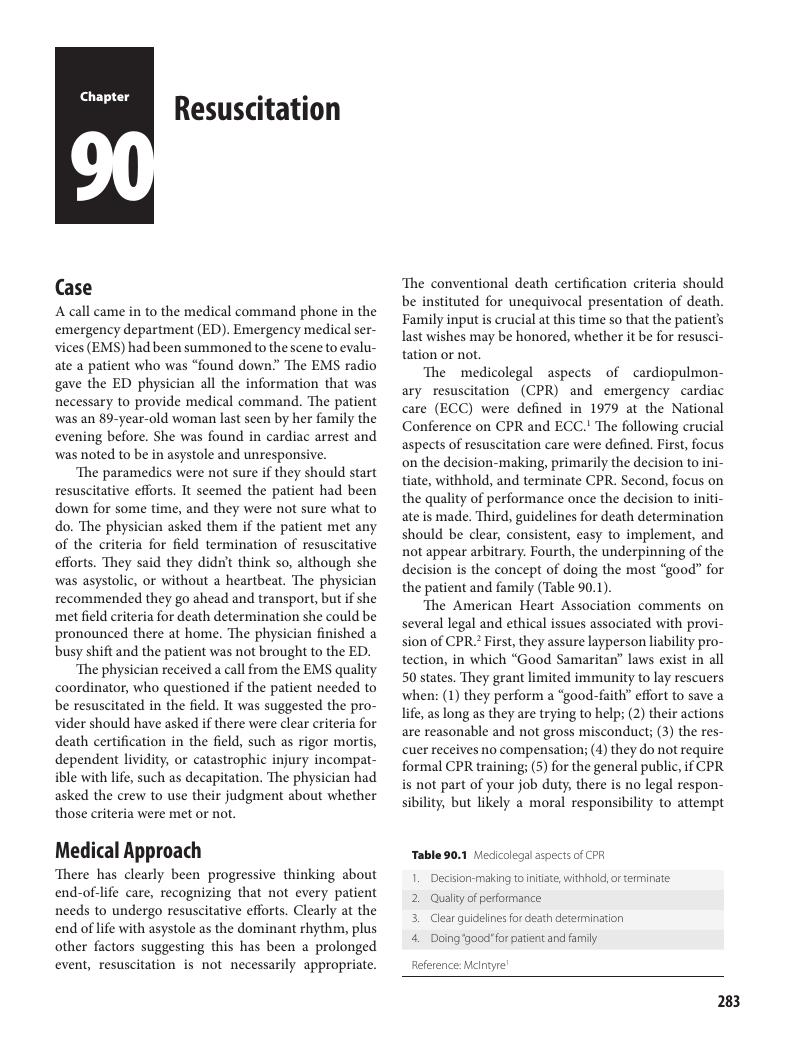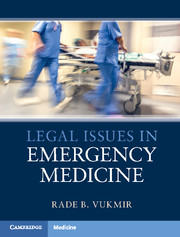Book contents
- Legal Issues in Emergency Medicine
- Legal Issues in Emergency Medicine
- Copyright page
- Contents
- Disclaimer
- Foreword
- Preface
- Introduction
- 1 Abandonment in the Emergency Department
- 2 Abandonment of Patient by Treating Physician
- 3 Admission
- 4 Advance Directives
- 5 Advanced Practice Providers
- 6 Adverse Event Disclosure
- 7 Against Medical Advice
- 8 Americans with Disabilities Act and Education
- 9 Americans with Disabilities Act and Access to Facilities
- 10 Assault
- 11 Assisted Suicide
- 12 Battery
- 13 Bed Boarding
- 14 Brain Death
- 15 Care of Children
- 16 Code Response
- 17 Commitment
- 18 Communication
- 19 Competence and Capacity
- 20 Confidentiality
- 21 Consultation
- 22 Controlled Substances
- 23 Criminal Charges
- 24 Criminal Acts
- 25 Death Certification
- 26 Decision-Making
- 27 Difficult Patient Encounter
- 28 Discharge Instructions
- 29 Disruptive Provider Behavior
- 30 Do Not Resuscitate
- 31 Documentation
- 32 Domestic Violence
- 33 Driving Impairment
- 34 Drug and Alcohol Abuse
- 35 Duty to Warn
- 36 Electronic Health Records
- 37 Emergency Consent
- 38 Emergency Medical Services
- 39 Emergency Medical Treatment and Labor Act
- 40 Employment Issues
- 41 Expert Witness
- 42 Fitness for Duty
- 43 Frequent User
- 44 Futility
- 45 Geriatric Abuse
- 46 Good Samaritan
- 47 Guidelines and Protocols
- 48 Health Insurance Portability and Accountability Act and Health Information Technology for Economic and Clinical Health Act
- 49 HIV
- 50 Hospital Medicine
- 51 Immigrant Care
- 52 Impaired Physician
- 53 Indigent Care
- 54 In-Flight Emergencies
- 55 Informal Consultation
- 56 Informed Consent
- 57 Insurance
- 58 Intoxication
- 59 Laboratory Testing
- 60 Left without Being Seen, Left without Treatment, and Elopement
- 61 Malpractice Claims
- 62 Mandatory Care
- 63 Mandatory Reporting
- 64 Medical Education
- 65 Medical Errors
- 66 Medical Records
- 67 Medical Screening Exam
- 68 Minor Consent
- 69 Missed Illness and Injury
- 70 Multiple Visits
- 71 Nursing
- 72 Operations
- 73 Organ Donation
- 74 Overcrowding
- 75 Pain Control/Medication
- 76 Patient Satisfaction
- 77 Pediatric Abuse
- 78 Peer Review
- 79 Policy/Procedure
- 80 Pregnancy
- 81 Prescription Writing
- 82 Privacy
- 83 Professional Boundary Issues
- 84 Protected Health Information
- 85 Psychiatric Care
- 86 Referral
- 87 Religion
- 88 Research
- 89 Restraint
- 90 Resuscitation
- 91 Service Contract
- 92 Sexual Assault
- 93 Social Media
- 94 Staff Privileges
- 95 Subpoena
- 96 Substance Abuse
- 97 Suicide
- 98 Telemedicine
- 99 Telephone Advice
- 100 Third-Party Duty
- 101 Transfer
- 102 Translation, Interpreting, and Language Issues
- 103 Triage
- 104 Unanticipated Death
- 105 Urgent Care
- 106 Violence
- Glossary
- Index
- References
90 - Resuscitation
Published online by Cambridge University Press: 14 March 2018
- Legal Issues in Emergency Medicine
- Legal Issues in Emergency Medicine
- Copyright page
- Contents
- Disclaimer
- Foreword
- Preface
- Introduction
- 1 Abandonment in the Emergency Department
- 2 Abandonment of Patient by Treating Physician
- 3 Admission
- 4 Advance Directives
- 5 Advanced Practice Providers
- 6 Adverse Event Disclosure
- 7 Against Medical Advice
- 8 Americans with Disabilities Act and Education
- 9 Americans with Disabilities Act and Access to Facilities
- 10 Assault
- 11 Assisted Suicide
- 12 Battery
- 13 Bed Boarding
- 14 Brain Death
- 15 Care of Children
- 16 Code Response
- 17 Commitment
- 18 Communication
- 19 Competence and Capacity
- 20 Confidentiality
- 21 Consultation
- 22 Controlled Substances
- 23 Criminal Charges
- 24 Criminal Acts
- 25 Death Certification
- 26 Decision-Making
- 27 Difficult Patient Encounter
- 28 Discharge Instructions
- 29 Disruptive Provider Behavior
- 30 Do Not Resuscitate
- 31 Documentation
- 32 Domestic Violence
- 33 Driving Impairment
- 34 Drug and Alcohol Abuse
- 35 Duty to Warn
- 36 Electronic Health Records
- 37 Emergency Consent
- 38 Emergency Medical Services
- 39 Emergency Medical Treatment and Labor Act
- 40 Employment Issues
- 41 Expert Witness
- 42 Fitness for Duty
- 43 Frequent User
- 44 Futility
- 45 Geriatric Abuse
- 46 Good Samaritan
- 47 Guidelines and Protocols
- 48 Health Insurance Portability and Accountability Act and Health Information Technology for Economic and Clinical Health Act
- 49 HIV
- 50 Hospital Medicine
- 51 Immigrant Care
- 52 Impaired Physician
- 53 Indigent Care
- 54 In-Flight Emergencies
- 55 Informal Consultation
- 56 Informed Consent
- 57 Insurance
- 58 Intoxication
- 59 Laboratory Testing
- 60 Left without Being Seen, Left without Treatment, and Elopement
- 61 Malpractice Claims
- 62 Mandatory Care
- 63 Mandatory Reporting
- 64 Medical Education
- 65 Medical Errors
- 66 Medical Records
- 67 Medical Screening Exam
- 68 Minor Consent
- 69 Missed Illness and Injury
- 70 Multiple Visits
- 71 Nursing
- 72 Operations
- 73 Organ Donation
- 74 Overcrowding
- 75 Pain Control/Medication
- 76 Patient Satisfaction
- 77 Pediatric Abuse
- 78 Peer Review
- 79 Policy/Procedure
- 80 Pregnancy
- 81 Prescription Writing
- 82 Privacy
- 83 Professional Boundary Issues
- 84 Protected Health Information
- 85 Psychiatric Care
- 86 Referral
- 87 Religion
- 88 Research
- 89 Restraint
- 90 Resuscitation
- 91 Service Contract
- 92 Sexual Assault
- 93 Social Media
- 94 Staff Privileges
- 95 Subpoena
- 96 Substance Abuse
- 97 Suicide
- 98 Telemedicine
- 99 Telephone Advice
- 100 Third-Party Duty
- 101 Transfer
- 102 Translation, Interpreting, and Language Issues
- 103 Triage
- 104 Unanticipated Death
- 105 Urgent Care
- 106 Violence
- Glossary
- Index
- References
Summary

- Type
- Chapter
- Information
- Legal Issues in Emergency Medicine , pp. 283 - 286Publisher: Cambridge University PressPrint publication year: 2018

